
Food Science of Animal Resources
Scope & Guideline
Empowering Scholars with Open Access to Cutting-Edge Research
Introduction
Aims and Scopes
- Quality and Safety of Animal-Derived Foods:
Research addressing the quality attributes, safety concerns, and preservation techniques for various animal-derived food products, including meat, dairy, and eggs. - Innovative Processing Technologies:
Studies exploring novel processing methods such as non-thermal technologies, sous-vide cooking, and packaging innovations aimed at enhancing food quality and extending shelf life. - Nutritional and Functional Properties:
Investigations into the nutritional composition, health benefits, and functional properties of animal products, including studies on bioactive compounds and their effects on human health. - Sustainable Practices and Alternatives:
Research focusing on sustainable practices in animal husbandry and the development of alternative protein sources such as cultured meat and edible insects. - Microbiological Studies:
Exploration of the microbiota associated with animal products, including probiotic applications, antimicrobial resistance, and foodborne pathogens. - Consumer Acceptance and Sensory Evaluation:
Studies assessing consumer perceptions, sensory characteristics, and market trends related to animal-derived foods.
Trending and Emerging
- Cultured Meat and Alternative Proteins:
A significant increase in research focused on cultured meat and alternative protein sources, reflecting growing consumer interest in sustainable and ethical food options. - Health and Functional Foods:
Rising attention on the health benefits of animal-derived foods, including studies on probiotics, bioactive peptides, and their implications for gut health and disease prevention. - Food Safety and Microbiological Control:
An increasing number of studies addressing food safety challenges, specifically microbiological risks associated with animal products and innovative decontamination techniques. - Sustainability and Environmental Impact:
Emerging research on sustainable animal production practices and the environmental impact of animal agriculture, aligning with global sustainability goals. - Food Processing Innovations:
Growing interest in novel food processing methods, such as high-pressure processing, ultrasound, and smart packaging technologies, aimed at enhancing product quality and consumer appeal.
Declining or Waning
- Traditional Fermentation Techniques:
There has been a reduction in the number of studies focusing solely on traditional fermentation methods, which may be overshadowed by emerging research on innovative food processing technologies. - Animal Welfare Studies:
Although still relevant, the frequency of publications specifically addressing animal welfare issues in the context of food production has decreased, possibly due to a shift towards more technical and processing-focused research. - Chemical Additives in Food Preservation:
Research on the use of chemical preservatives and additives in animal products has seen a decline, as there is a growing emphasis on natural alternatives and clean-label products.
Similar Journals
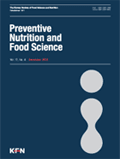
Preventive Nutrition and Food Science
Transforming Dietary Insights into Preventive StrategiesPreventive Nutrition and Food Science, an esteemed journal published by the Korean Society of Food Science and Nutrition, serves as a pivotal platform for the dissemination of innovative research and insights in the fields of food science, nutrition, and dietetics. With an ISSN of 2287-1098 and an E-ISSN of 2287-8602, this journal is dedicated to advancing knowledge from 2012 through 2024, showcasing contributions that reflect the interplay between nutrition, health, and preventive strategies. Indexed in Scopus, it proudly holds a Q2 ranking in Food Science and a Q3 ranking in Nutrition and Dietetics as of 2023, positioning it among influential publications within these disciplines. Researchers, professionals, and students can explore cutting-edge studies that contribute significantly to evidence-based practices, enhancing public health and nutritional care. Although it operates under a subscription model, the journal plays a crucial role in fostering a deeper understanding of preventive nutrition, advocating for advancements that address contemporary dietary challenges.

Journal of Food and Nutrition Research
Connecting Academia and Industry for Nutritional ExcellenceJournal of Food and Nutrition Research, published by the VUP FOOD RESEARCH INST in Bratislava, Slovakia, serves as a vital platform for disseminating cutting-edge research in the fields of food science and nutrition. With an ISSN of 1336-8672 and an E-ISSN of 1338-4260, this journal emphasizes the importance of interdisciplinary approaches to address contemporary challenges related to food quality, dietary practices, and nutritional health. Notably recognized in the 2023 Scopus rankings, the journal is classified in Q3 quartiles for both Food Science and Nutrition & Dietetics, providing a forum for researchers aiming to enhance knowledge and practices within these domains. Those engaged in academia and industry will find the journal invaluable for its comprehensive scope, which covers novel food technologies, nutrition interventions, and the implications of dietary behaviors. Though not open access, the journal is dedicated to enriching the academic conversation and contributing to advancements in public health and nutrition policies.

CZECH JOURNAL OF FOOD SCIENCES
Transforming Food Systems Through Rigorous ResearchCzech Journal of Food Sciences is a premier publication in the field of food science, disseminating vital research since its inception in 1999 and transitioning to Open Access in 2007. Published by the Czech Academy Agricultural Sciences, this journal facilitates the exchange of knowledge among researchers, professionals, and students dedicated to advancing the understanding of food systems, safety, and technology. With an ISSN of 1212-1800 and an E-ISSN of 1805-9317, it holds a respectable position with a Q3 ranking in the Food Science category for 2023, illustrating its commitment to high-quality research despite its Scopus rank of 209 out of 389, situated in the 46th percentile. Located in the heart of the Czech Republic, at TESNOV 17, PRAGUE 117 05, this journal serves as an essential resource for those involved in agricultural and biological sciences, paving the way for innovative discoveries and applications in food science.
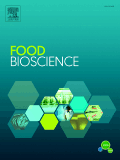
Food Bioscience
Connecting Research to Real-World Food SolutionsFood Bioscience is a leading peer-reviewed journal published by Elsevier, dedicated to advancing the understanding of the complex interplay between food science and biosciences. With an impressive Impact Factor that places it in the Q1 and Q2 quartiles for Food Science and Biochemistry respectively, the journal consistently ranks among the top publications in its field, reflected in its Scopus rankings (Rank #83/389 in Food Science and Rank #175/438 in Biochemistry). Since its inception in 2013, Food Bioscience has fostered a multidisciplinary approach, bridging gaps between research in agricultural, biological, and food sciences, thus encouraging innovative solutions to the pressing challenges facing the global food supply chain. Although it currently operates under a subscription model, the journal is committed to disseminating high-quality research, making significant contributions to both academic scholarship and industry practices. Researchers, professionals, and students alike are invited to explore the wealth of knowledge contained within its pages as it plays a pivotal role in shaping the future of food bioscience.
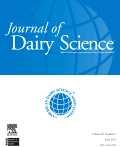
JOURNAL OF DAIRY SCIENCE
Championing Quality Research in Dairy and BeyondThe JOURNAL OF DAIRY SCIENCE, published by Elsevier Science Inc., stands as a premier outlet for scholarly research in the fields of Animal Science, Food Science, and Genetics. With an impressive legacy dating back to 1917, this esteemed journal continues to contribute significantly to the advancement of dairy science and related disciplines, boasting a remarkable Q1 status across its categories as of 2023. In the realm of Agricultural and Biological Sciences, it ranks 15th out of 490 in Animal Science and Zoology, indicating a strong influence and recognition in the field. Researchers and professionals worldwide rely on this journal for the latest findings, innovative techniques, and comprehensive reviews, making it an essential resource for advancing knowledge and practices within the dairy sector. While the journal maintains a subscription-based access model, its rich content remains unparalleled in guiding future research and fostering collaborative advancements. Its enduring commitment to quality sets a high standard for publication, reinforcing its invaluable position in the scientific community.

Journal of Agriculture and Food Research
Transforming Agricultural Challenges into OpportunitiesJournal of Agriculture and Food Research, published by ELSEVIER, is a premier Open Access journal that has made significant strides in the fields of agricultural and biological sciences since its launch in 2019. With an ISSN of 2666-1543, the journal is headquartered at Radarweg 29, 1043 NX Amsterdam, Netherlands. It holds a remarkable position in the 2023 Category Quartiles, achieving Q1 rankings in Agricultural and Biological Sciences (miscellaneous), Agronomy and Crop Science, and Food Science. The journal's impactful research is reflected in its impressive Scopus ranks, including a ranking of #25 in Agricultural and Biological Sciences, showcasing the journal's commitment to high-quality, innovative research relevant to contemporary agricultural challenges. Researchers, professionals, and students can benefit from its diverse array of published works, fostering a greater understanding of food security, sustainable agriculture, and innovative food technologies. By embracing an open access model, the journal ensures that critical research is readily available to a global audience, aiming to enhance knowledge dissemination in this vital field.
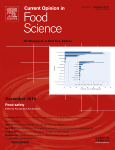
Current Opinion in Food Science
Shaping Tomorrow's Food Landscape TodayCurrent Opinion in Food Science is a premier peer-reviewed journal published by ELSEVIER SCI LTD that focuses on the latest advancements and research in the domain of food science and technology. With its ISSN 2214-7993 and E-ISSN 2214-8000, this journal serves as a critical platform for researchers and professionals to share insights and opinions on emerging trends, innovations, and challenges faced in food science. The journal enjoys an impressive impact factor and ranks in the first quartile (Q1) in both Applied Microbiology and Biotechnology and Food Science, symbolizing its influence and reputation in the field. It is strategically located in the Netherlands and conducts its academic dialogue with a broad scope that includes essential topics in food safety, nutrition, and sustainable practices. Operating from 2015 to 2024, the journal has established itself as a critical resource for the global academic community, boasting excellent Scopus rankings—#9 out of 389 in Food Science and #6 out of 127 in Applied Microbiology and Biotechnology—indicating its high relevance and impact. Readers can look forward to insightful articles and comprehensive reviews that bridge the gap between fundamental research and practical application in the ever-evolving food science landscape.
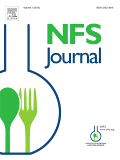
NFS Journal
Pioneering discoveries that nourish the future.NFS Journal, published by ELSEVIER, is at the forefront of research in the fields of Food Science and Nutrition and Dietetics, boasting an impressive impact factor that underscores its significance. With an Open Access model since 2015, the journal facilitates widespread dissemination and accessibility of high-quality research, making it a valuable resource for scholars and practitioners alike. Located in Germany, this journal has made its mark with its prestigious Q1 ranking in both Food Science and Nutrition and Dietetics as of 2023, positioning it among the top-tier journals in these disciplines. Additionally, it holds an outstanding standing in Scopus rankings, being placed at 10th out of 140 in Nutrition and Dietetics and at 27th out of 389 in Food Science, reflecting its influence and reach within the global academic community. The NFS Journal is dedicated to publishing the latest advancements and practices that shape our understanding of the relationship between food, health, and nutrition, appealing to researchers, professionals, and students eager to stay updated with novel insights and breakthroughs.
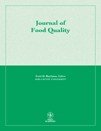
JOURNAL OF FOOD QUALITY
Pioneering Insights for Safer, Higher Quality FoodThe Journal of Food Quality, an esteemed publication under Wiley-Hindawi, stands as a vital resource in the dynamic field of Food Science, established since 1977 and operating under an Open Access model since 2017. With its seat in the United Kingdom, this journal focuses on delivering high-quality research and insights pertaining to food safety, risk management, and quality assurance, reflected in its impressive Q2 ranking in both Food Science and Safety, Risk, Reliability and Quality categories in 2023. Researchers and professionals will find the journal’s contributions indispensable, particularly given its Scopus rankings that place it in the top echelons of its fields, highlighting its impact and relevance. By fostering an environment of knowledge sharing, the Journal of Food Quality not only enhances academic dialogue but also supports innovation and best practices in food research and industry applications.
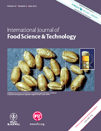
INTERNATIONAL JOURNAL OF FOOD SCIENCE AND TECHNOLOGY
Advancing the Future of Food Science and TechnologyINTERNATIONAL JOURNAL OF FOOD SCIENCE AND TECHNOLOGY, published by WILEY, serves as a premier platform for the dissemination of cutting-edge research in the field of food science and technology. With an ISSN of 0950-5423 and E-ISSN 1365-2621, this journal has been committed to publishing high-quality research since 1966 and is set to continue its impactful contributions through 2024. Recognized for its excellence, it holds a Q1 ranking in Food Science and a Q2 ranking in Industrial and Manufacturing Engineering as of 2023. The journal ranks #95/384 in Industrial and Manufacturing Engineering and #100/389 in Food Science on Scopus, placing it within the top quartiles of these fields. Although it does not currently offer Open Access, researchers and professionals benefit from access to a wealth of knowledge that advances understanding in both applied and theoretical aspects of food science. This journal is indispensable for anyone in the academic and professional domains who seeks to stay abreast of innovations and trends shaping the food industry.